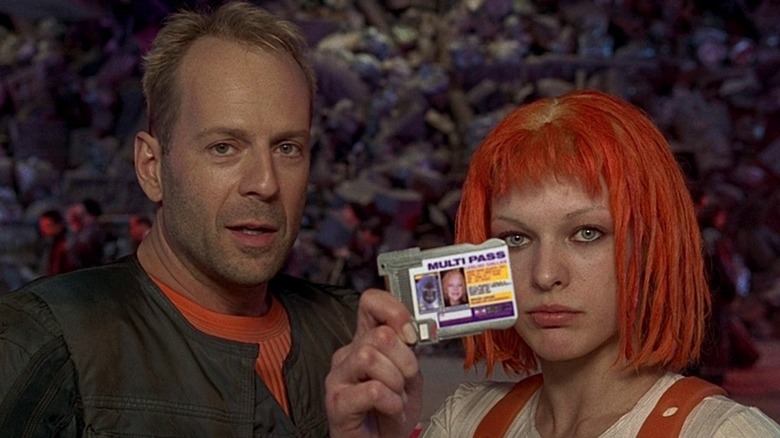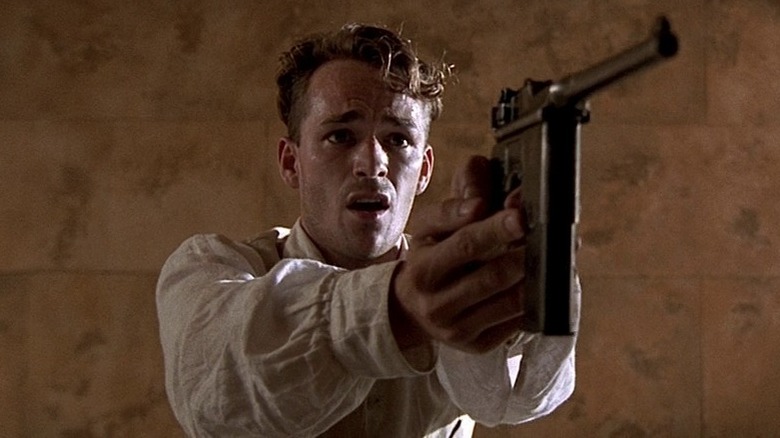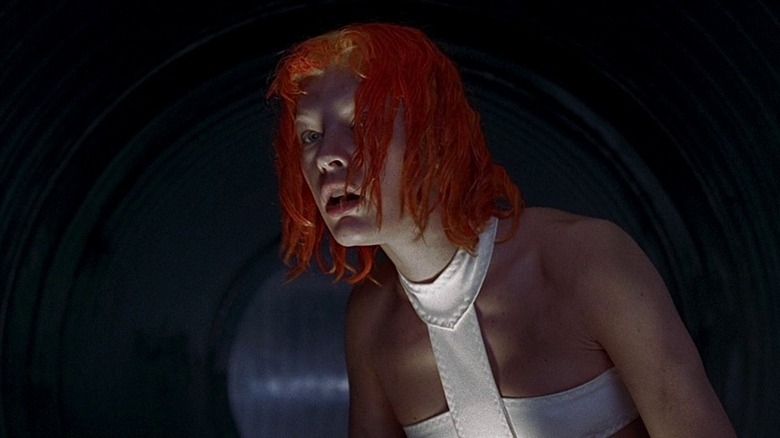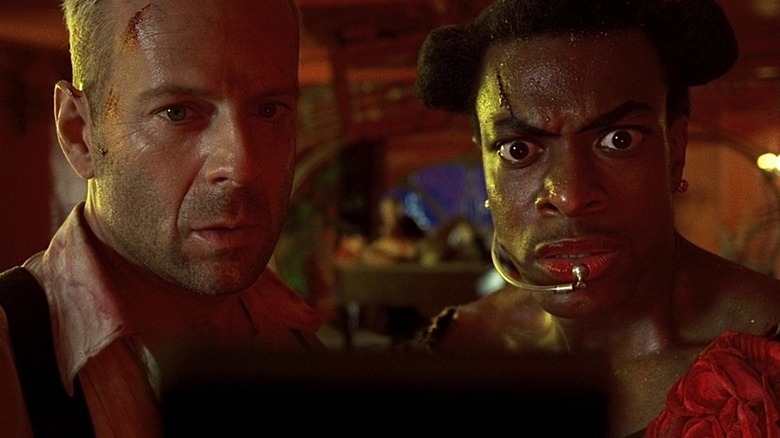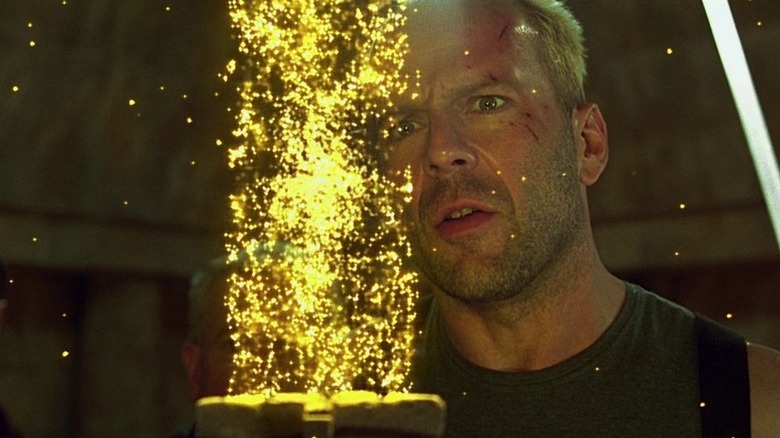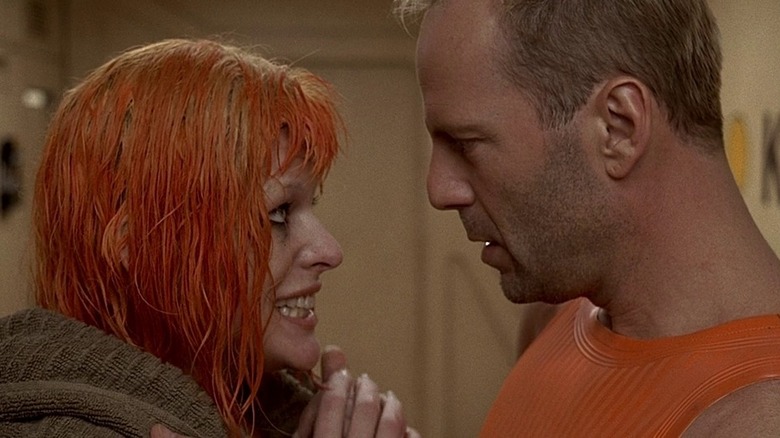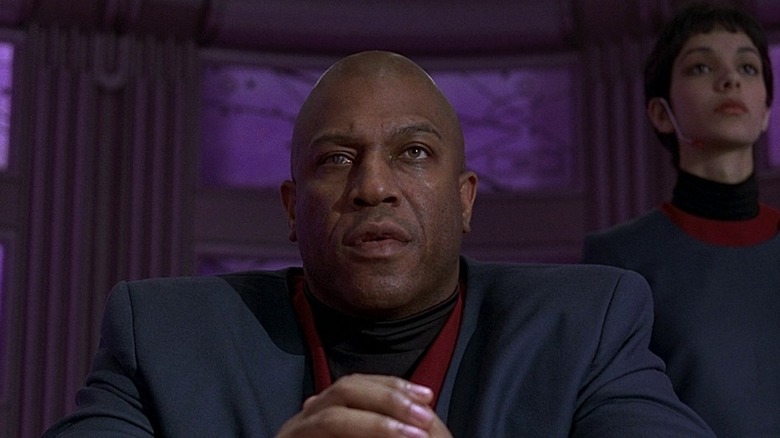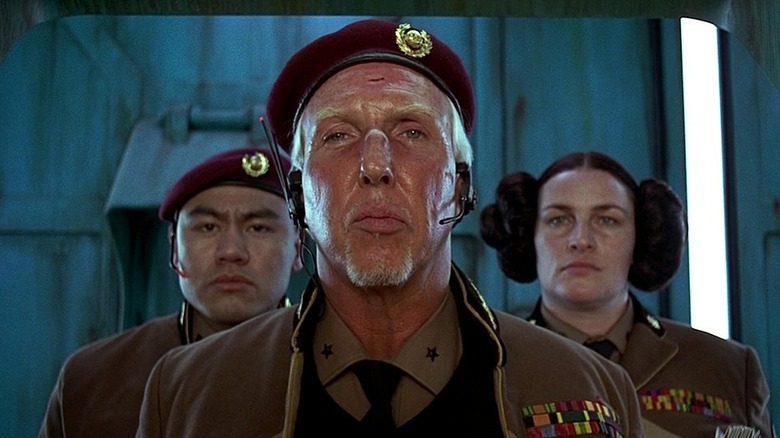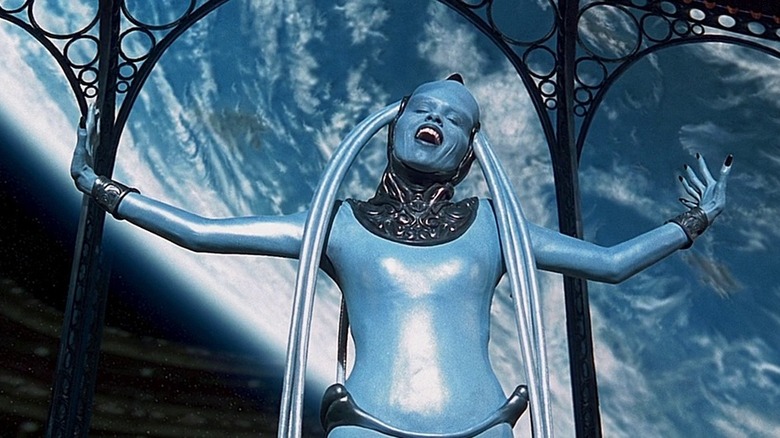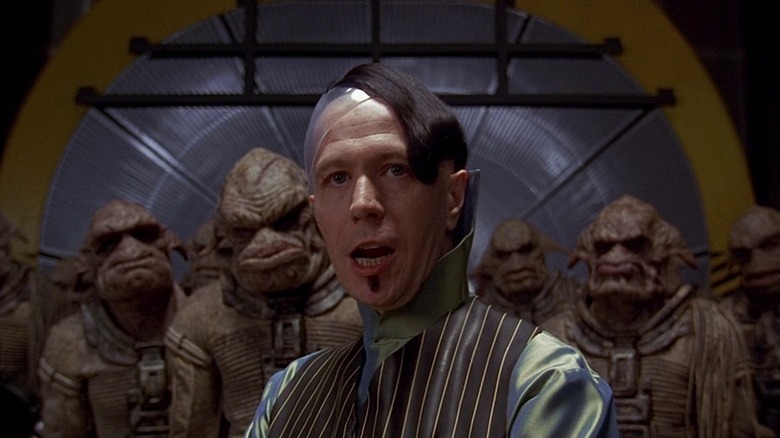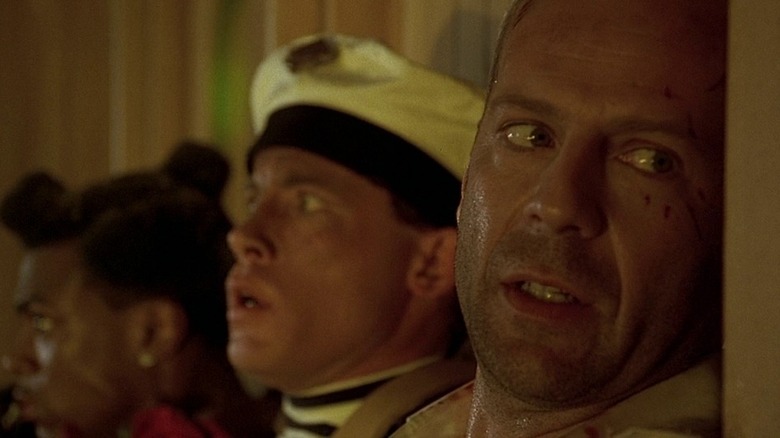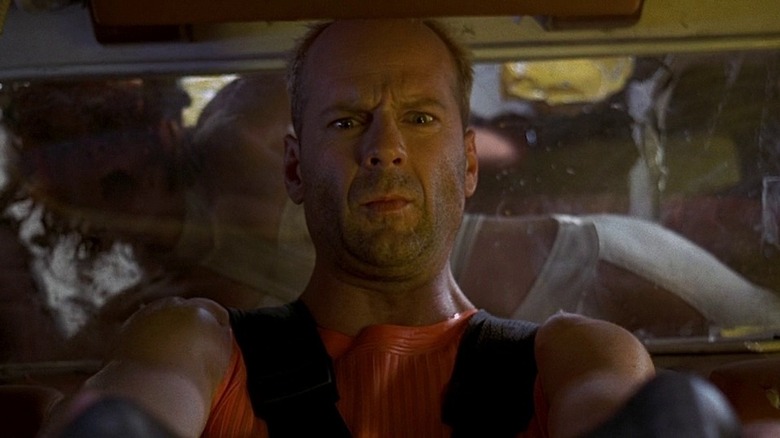The Ending Of The Fifth Element Explained
The '90s gave birth to a number of sci-fi cinema classics, from vibrant comedies like "Men in Black" and "Galaxy Quest" to grim thrillers like "Dark City" and "12 Monkeys." But when it comes to colorful and zany science-fiction adventures, there's one movie from the '90s that requires special mention: "The Fifth Element."
Written and directed by French auteur Luc Besson, the film stars Bruce Willis as Korben Dallas, a world-weary ex-military commando turned cab driver in an overpopulated future New York City. Milla Jovovich plays Leeloo, a human-alien-clone-hybrid whose existence must be protected because she's key to stopping a cosmic threat that could bring about the end of all life on Earth ... and beyond. To save her and the planet, Dallas must locate four ancient stones, but he's not the only one looking for them: The deranged Jean-Baptiste Zorg (Gary Oldman) and a group of deadly alien mercenaries are after them, too.
From start to finish, "The Fifth Element" is a non-stop joyride of outer space action and tongue-in-cheek humor. But it also reverberates with a powerful message and plenty of heart. And when the dust settles and the credits roll, even decades after its release, there's still a lot to unravel. So, grab your multi pass, because this is the ending of "The Fifth Element" explained.
What you need to remember about the plot of The Fifth Element
"The Fifth Element" may take place some 200 years in the future in the 23rd century, but actually begins in the past, opening at the site of ancient Egyptian ruins in 1914. There, we meet an archeologist who discovers hieroglyphs depicting a visitor from the stars that threatens the world. The visitor is opposed by four elements — fire, water, air, and earth — surrounding a strange fifth element. As it turns out, every 5,000 years an ancient evil comes to Earth to unleash destruction, and only the intervention of an alien race known as the Mondoshawans has been able to stop them. When the Mondoshawans arrive in 1914, we learn that stones representing the four elements were whisked away from Earth for safekeeping.
Flashing forward to the year 2263, the President of the Federated Territories (Tiny Lister) is informed of a mysterious planetoid approaching Earth. All military means of stopping it fail, and its nature is unknown until Father Vito Cornelius (Ian Holm) informs him of the Mondoshawans and the prophecy of the ultimate evil that is due to destroy the planet. But a group of alien bounty hunters working for industrialist madman Jean-Baptiste Zorg attack an approaching Mondoshawan ship carrying the fifth element, which is the only thing that can stop the approaching evil. Though the Mondoshawan ship is destroyed, a surviving piece of DNA allows scientists to reconstruct the fifth element.
A fight for Leeloo
To the surprise of everyone, the fifth element turns out to be Leeloo, a humanoid woman who is said to be the perfect evolution of mankind — though she initially can only speak an ancient alien language and has the mentality of a child. But when she escapes the government facility and falls (literally) into the lap of New York cab driver Korben Dallas, it kicks off a thrilling chase to save the world.
Korben is the only person Leeloo seems to trust, but government forces aren't the only ones who want to capture her and the stones; there's also Cornelius, who is descended from an order of priests tasked by the Mondoshawans to pass down knowledge of the fifth element through the centuries. And let's not forget Zorg, who has been enlisted by the very approaching evil itself to stop the five elements from being assembled. And when Zorg's alien mercenary forces find themselves at odds with him, it sets up a four-way race for the stones.
Things take a sudden turn when the military recruits Dallas to go undercover on a space cruise to the planet Fhloston Paradise where it's believed the stones are being held. With Leeloo posing as his wife, Dallas is ordered to get the stones back to Earth and save the world. Zorg, Cornelius, and the alien mercenaries also head for Fhloston Paradise, where DJ Ruby Rhod (Chris Tucker) is hosting an operatic alien named Diva Plavalaguna.
What happened at the end of The Fifth Element?
The ending of "The Fifth Element" begins aboard a flying hotel orbiting Fhloston Paradise where Zorg has taken it upon himself to collect the four elemental stones after his Mangalore mercs fail to get the job done. But the Mangalores are there to steal the stones from Zorg. During the performance from Diva Plavalaguna, Zorg and the Mangalores both attack the hotel separately, fatally wounding the alien opera singer. While Leeloo fights off the mercenaries, Zorg sneaks in and steals a case he believes contains the stones.
After Zorg escapes, though, the Diva reveals that stones have been hidden inside her body, and as she dies, Dallas recovers them. Together with the surprisingly helpful Ruby Rhod, Dallas battles the Mangalores in an explosive action set piece that culminates in the destruction of the hotel thanks to a bomb planted by Zorg. Luckily, Dallas is able to rescue a wounded Leeloo, and he, Rhod, and Cornelius manage to escape the hotel and get to Earth just as the ultimate evil is closing in.
Back in the ancient Egyptian temple, Dallas and Cornelius figure out how to activate the stones, but a dying Leeloo seems unable to summon the strength to complete the configuration. Following a last-minute push from Dallas — that includes a passionate kiss and a declaration of love — Leeloo acts in concert with the stones, sending a beam of blue light into the sky and turning the ancient evil planetoid into a dead rock ... or, as it is soon to be known, Earth's second moon.
What did the ending of The Fifth Element mean?
Throughout "The Fifth Element," Korben Dallas and Leeloo face plenty of obstacles and dangers, from the Mangalore mercs to Zorg himself, and even the NYPD who chase them through the skies of the Big Apple. But the final threat isn't from a deadly enemy — it's from Leelo herself. When she's needed to stop the ultimate evil, she suddenly begins to question the point of their entire mission. Since she was first brought to life by government scientists, all she knows about humanity is its history of war, death, and destruction.
In the film's climactic scene in the temple, Leeloo asks Dallas point blank, "What's the use of saving life when you see what you do with it?" Dallas attempts to convince her that there is more to humanity than just war. There are good things about life — even beautiful things — that are worth saving ... like love. Until this moment, Leeloo never knew love, but with a passionate kiss, Dallas shows her exactly what's worth fighting for. And it helps Leeloo awaken her inner power just enough to defeat the great evil, proving that love is the only thing that can stand against war and destruction. It's a more spiritual meaning than one might expect from an arguably silly action-adventure set in space, but one that resonates all the more loudly because of its tonal difference from the rest of the film.
Was love the sixth element?
"The Fifth Element" is a sci-fi extravaganza led by "Die Hard" star Bruce Willis, and it features some seriously over-the-top action and plenty of jaw-dropping spectacle. It also contains a surprising amount of humor, with more than one slapstick moment that would make Laurel and Hardy proud. It also contains some religious and spiritual elements in the message that love can conquer all. The real question, however, is whether love might actually be a sixth element needed to overcome the great evil.
Admittedly, the film never says that the love between Dallas and Leeloo was necessary to end the threat and stop evil. The hieroglyph at the beginning of the film only shows the four elements surrounding the humanoid fifth, but it could very well be that love — whether it be love for another person, love for humanity, or any other kind of powerful feeling — may be a necessary component to activating the power needed to destroy evil. After all, Leeloo isn't the actual fifth element, only a genetic recreation, meaning that the original may have already possessed the love needed to stop evil. It could also be that the fifth element itself isn't Leeloo, but the love within her, which would explain why her presence alone could not stop the ultimate evil, and she was only able to thwart it after being kissed by Dallas and having her love released.
What was the great evil that threatened Earth?
When "The Fifth Element" opens, we find the President of the Federated Territories getting a report from his military commanders regarding a mysterious planet-shaped object approaching Jupiter. They don't know what it is but try using powerful warheads to destroy it. These weapons of destruction only succeed in fueling its increased size as it gets closer to Earth. It apparently exists outside of our universe and only emerges due to a rare celestial alignment every 5,000 years. Seeking to destroy all life, the planetoid is only ever referred to as "the ultimate evil." So ... what is it?
Unfortunately, the movie gives few concrete answers, though we do know that the great evil does possess a great intelligence. It's later revealed that it uses the alias "Mr. Shadow" to communicate directly with Jean-Baptiste Zorg, who it hires to collect the four elemental stones in an effort to stop the only thing capable of opposing it. We also know that it can kill from a distance because during the planetoid's confrontation with the military, it somehow forces a pool of blood to appear on the commander's forehead, just as it does to Zorg during its threatening phone call.
Of course, the truth is that the nature of the great evil isn't really important, as it only exists in the story to serve as a physical representation of the dark forces that threaten mankind. It's an abstract concept that endangers humanity, and what it truly is can be left up to the viewer. After all, love is an abstract concept, so it wouldn't be much use against a physical threat ... but it might have a fighting chance at defeating another abstract concept, right?
The hidden meaning of The Fifth Element
Beneath the more obvious themes of good vs. evil and the power of love, "The Fifth Element" hides a more subtle message that some might not see. Pay attention to some of the details, and it's really not hard to notice that the film is critiquing both American capitalism and American militarism. After all, the film's French-born director chose to set his film in America, with even British actors like Gary Oldman imitating American accents.
"[Americans] are very self-centered," Besson said in a 2017 interview when speaking about the American reaction to the film. "It's about their power, their control, and they want to have a good image of themselves," the director said. With that thought in his mind, Besson crafted a film where police and military are oppressive in their control, overreaching in their authority, and brutal in their application of that authority. At one point, Zorg delivers a speech about how in his capitalist philosophy, destruction fuels life and gives it purpose and meaning.
Speaking of Zorg, he's also the head of a conglomerate that employs the city's cab drivers, and he cruelly lays off a million of them. This includes Dallas, whom Zorg never meets. But the kicker is in a deleted subplot that audiences never saw — a garbage worker's strike is put down by police forces, demonstrating the future America's unforgiving stance on worker's rights.
How the Fifth Element and its ending were inspired by Plato
It might be tempting to assume that "The Fifth Element" was based on a French comic book that director Luc Besson read as a child. Thanks to contributions from popular illustrator Jean Giraud and fashion designer Jean Paul Gaultier, the film resonates with comic book flair. But the movie is wholly original, all spilling from the mind of Besson, who created the story when he was a teenager growing up just outside of Paris. But while working on the story, Besson felt that there was something missing, and he found inspiration from an unlikely source: Greek philosopher Plato.
"I struggled a lot with the script" Besson told Nerdist in a 2017 interview. According to the director, he struggled with the core of the story, but discovered his younger sister working on a school project about the famous philosopher Plato. "He wrote about [the five elements which were thought to comprise all matter], you know the water, the earth, the fire, and the air. And the fifth element is the human being." After this "Eureka!" moment, Besson put together his idea for a futuristic cab driver with the tale of five elements — with Leeloo as the fifth. The elemental forces and a plot to destroy all life helped give the film its biggest stakes, leading to the big climactic moment at the film's conclusion.
What has Luc Besson said about the end of The Fifth Element?
Having conceived of "The Fifth Element" growing up, Luc Besson considers the project near and dear to his heart. And he wound up making the most expensive film in the history of French cinema. For it to work, though, he had to marry action-adventure and science fiction with heartfelt drama and a healthy helping of humor. And the humor was key in setting up the film's emotional ending.
"You have to make a joke with it because it's so classical," Besson said of the movie's central story elements while speaking with Mr. Showbiz in 1997. "Everybody wants to save the world — and these are the worst people to save the world. The theme is more [important]. I want to arrive at the point where Leeloo will say, 'What's the use of saving lives when you see what you're doing with it?'" For Besson, that single line is the core of the film, a meaningful message delivered at the end of a rollicking space adventure.
"That's the demonstration of the film," Besson explained. "Even if it's funny and there's a lot of excitement and things, at the end after almost two hours, you say, 'She's right. What's the use to save life when you see what we do with it?'"
How filming the ending of The Fifth Element got out of control
Bruce Willis is no stranger to explosive action, having starred in classics like "Die Hard," "The Last Boy Scout," and "Striking Distance." So when the end of the sci-fi adventure called for Willis to face down a group of heavily armed alien mercenaries and jump away from an exploding bomb in an effort to save a beautiful woman, it was nothing new for him. Director Luc Besson may have had some experience on action-thrillers like "Nikita" and "Léon: The Professional," but the action in "The Fifth Element" took it to a whole different — and more dangerous — level.
In an interview during the film's initial press tour, Besson talked about how he nearly burned down Pinewood Studios in England when working on the pyrotechnic stunts in the film's finale, which incredibly were all filmed on sound stages. Initially, he said, he wanted Bruce Willis to deliver his line after the explosion and then immediately go back to get more takes, so it would all have the same burning wreckage behind him. Unfortunately, the explosion on set was much bigger than anyone expected, and Willis didn't have time to go again because safety measures had to be undertaken.
Besson recalled, "He said the line, I said 'Go back to the start,' and he starts to go back and there are 15 firemen just invading the place and kicking everybody out."
Could there ever be a sequel to The Fifth Element?
"The Fifth Element" may only have tallied $63 million at the U.S. box office, but stronger performances in other countries pushed it to $263 million worldwide. Combined with its popularity on home video in the following years where it became a hit with more fans, the movie became a bona fide classic and fans have been asking for decades if we could ever see a sequel. The reason we haven't seen one yet, though, is the same reason we probably never will: Creator and director Luc Besson has no interest.
"For me there's no point to go back to the same place," he told Entertainment Weekly. "No matter how much you love a film, the fun is to try something else. Otherwise, I'm going to do 'Fifth Element,' 'Sixth Element,' 'Seventh,'" he said with clear frustration when it comes to Hollywood's obsession with sequels. "That's not interesting," he concluded. Of course, in 2017, he talked about the possibility of doing a sequel to "Valerian and the City of a Thousand Planets," but was quick to explain why "The Fifth Element" was different.
"In 'The Fifth Element,' there's nothing in the DNA to make a sequel," he told ComicBook.com. "There is none. [Dallas and Leeloo] just live together, and they're happy, and she's the fifth element, and that's it, and they resolve the problem." For Besson, it's all about what's honest about the story. "[A sequel] will be fake. It will be just for money, and I'm not interested."
